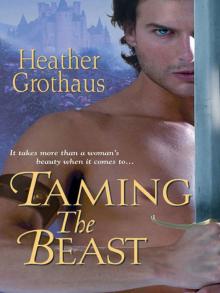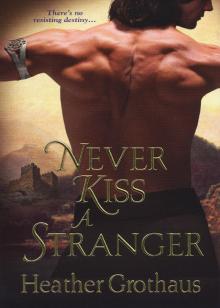- Home
- Heather Grothaus
Roman Page 9
Roman Read online
Page 9
“The sky is clear,” he said, throwing back the canvas as if turning down bedcovers. A warm, musty smell wafted up from the cart bed, and he wondered how she had withstood such a close space for so many hours. He went to the end of the cart and let the gate down as her ghostly shrouded figure sat up. “It should be pleasant for sleeping.”
He held out his hand toward her, but she ignored it, gripping her satchel to her chest and scooting to the edge of the cart farthest from him before sliding to the ground. She clutched at the side of the cart as she stumbled around the end of it but seemed to regain her balance quickly as she started off toward the wide gnarled tree.
“I’ll lay a fire,” he called out after her.
She did not acknowledge him, only passed the tree and stepped over the sick flags to disappear into the fringe of tall weeds at the edge of the field.
Roman grabbed the small bag behind the driver’s seat and tossed it to the ground as he walked toward the tree himself, scanning the ground beneath it and collecting limbs and twigs until his left arm was full. Then he chose a spot between the tree and the cart to scrape the dead grass away with his sandal until he found damp dirt. He dumped his wood and then squatted, building a conical structure of twigs and leaves before reaching for the bag and removing the flint and fluffy tinder.
He was laying sticks on the fledgling fire when Isra stepped back into the circle of flags. She went to the cart and spread her shroud on the side of it, then returned to stand across the fire from Roman, her satchel still in her hand. She was looking at him for the first time since early that morning when he raised his face to her.
“There is more wood on the edge of the field. Shall I retrieve it?”
Her eyes seemed puffy in the shuddering yellow glow of the flames, and he wondered if she had been crying.
“Thank you,” he said.
She set her satchel down and disappeared again.
While she was gone, Roman went to the secret compartment of the cart and withdrew the sack containing their foodstuffs. By the time Isra returned with a sizable amount of sticks and branches, Roman had visited the babbling creek across the road from their camp to fill their small bucket with water and then laid their meal upon a cloth: a large round of bread, hard cheese, pickled eggs, and a carafe of wine.
She seemed to take great pains to lay each stick neatly just beyond the fire before coming back to kneel at the edge of the cloth. Her head was bowed and she seemed to be waiting.
Roman thought it was perhaps her way to say a blessing before a meal and so he cleared his throat and recited one of the prayers the fat Brother Hilbert imposed upon the brethren at Melk before they dined. He skipped a great part of the middle, true, but even after he had crossed himself and looked up, Isra made no move to touch the food.
“Do you not care for cheese?” he asked and reached for the bag he’d set aside. “I believe there are some nuts—”
“I am only waiting for you to first be satisfied,” she replied. “I will eat after you.”
Roman froze, the bag hanging suspended from his hand. “Why?”
She looked up at him then. “Why?”
“Why won’t you dine with me?”
“It is—” She paused, and the firelight emphasized the peaks and valleys of her frown, the hollows of her eyes and temples. “It is improper for me to eat before you. We are not equal.”
Roman set the bag straight down while still in his fist. “How exactly are we not equal?”
“My lord—” she began, a pained expression coming over her oval face.
“No,” he interrupted. “Isra, I mean in no way to be harsh with you, but I have told you before that I am no lord. And certainly not yours. There isn’t a drop of titled blood in my veins. It’s improper for you to refer to me as such.”
Her frown intensified. “Shall I then call you master?”
“No!” Roman said, horrified.
She dropped her eyes back to the untouched meal. “I do not understand. Forgive me.”
“I’m sorry, I didn’t mean to shout,” he said. “You’ve done nothing wrong.”
“What is it your wish I should call you? Please, have mercy and tell me, for I do not wish to incur your scorn again.”
Roman stared at her. “Scorn? I’m not—” He paused and took a deep breath. “Roman. Just call me Roman. And we shall eat at the same time.”
Her eyes flicked up. “As you wish. I shall call you Roman.” She reached out and picked up the bread. She tore it in half, although one side was considerably larger than the other, and then handed the larger piece to Roman.
“Thank you,” he said. He gestured to her with the hunk of bread and then took a large bite. He was still chewing when he saw the little smile come over her face as she at last brought her own morsel to her mouth, nibbling on it.
He’d eaten first, just as she’d wanted.
“I see what you did,” he said after swallowing the hard, lumpy dough.
“I should never think to hide anything from you,” Isra replied. She returned her bread to the cloth and picked up the carafe. “May I pour you some wine?”
He reached out and took the carafe from her. “You’re not my servant, Isra.”
The woman placed her palms on her thighs. “I owe you a debt I can never repay in this lifetime. You must allow me to serve you.”
“I do believe our debts to each other negate any repayment,” he said and poured two cups of wine. “I’ve never had a servant in my life, and I’m not about to allow it now from the woman who saved my friends from execution.”
“That which I did was also for my own benefit,” she admitted.
“Perhaps that is true,” Roman allowed. “But it doesn’t change the fact that what you did saved the lives of the three men who I consider my only family.” He took a drink, if only so Isra would. She had to be thirsty.
The dark-haired woman lowered her cup. “What of your true family? Were you an orphan?”
Roman picked up one of the eggs and took a bite, taking a moment to think upon a subject his mind hadn’t come near in years.
“No, I wasn’t an orphan,” he said at last. “I had a mum and a father. Brothers and sisters, too, although I can’t recall how many or their names. More than I could count on one hand. The earliest memory I have is of our small home.” He paused. “I haven’t seen any of them since I was six.”
Isra selected the smallest piece of cheese. “What happened to that boy who was yet so small?”
Roman laughed despite the vague feelings of sadness this discussion was rousing in him. “I wasn’t small, even then. It’s actually the reason I was sent away. My father said I ate too much, so he found an apprenticeship for me in the city. A stonemason who needed another slave. My departure brought much-needed coin into their house.” He glanced up and saw that Isra was looking at him levelly, and there was no pity or regret in her eyes.
“You clearly performed your duties well.”
Roman nodded, feeling the sadness fade away. “That I did. I had my own crew by the time I was twenty. Five years after, I was my own master.” He popped the last of the egg into his mouth.
He thought he saw something like admiration shining in her eyes, and Roman had to admit that it gave him a feeling of pleasure.
“You are not beholden to any lord? To no king?” she asked, a tinge of amazement in her voice as she tore a small piece of bread from the portion she still claimed.
Roman shook his head. “Only to the man or principality that hires me.”
“You enjoy more freedom than the wealthiest lord, then.”
He chuckled as he raised his cup to his lips. “I used to,” he said before taking a drink.
Isra dropped her eyes again, and so he thought to soothe her worry. “At Melk I do not toil for months in desert heat. It is a good life.”
She glanced up for only an instant, and it gave Roman relief to see that she no longer wore the chastised look he’d seen a moment before. He wan
ted to inquire as to her own past—the mother, the sister she’d lost—how such a beautiful and well-spoken woman had come to be enslaved in the basest of occupations in Damascus, but he did not want to see a reemergence of the fear and anxiety that had only now faded the slightest bit. And so he finished his meal much as Isra finished hers, in peaceful silence.
They gathered up the remnants of the food, returning the supplies and Isra’s satchel to the compartment hidden beneath the cart bed.
“The sky is clear,” Roman pointed out again as he fastened the latch. “It will likely become quite cold tonight; I’ll sleep beneath the cart.”
She was gathering her shroud from the side of the wagon as he spoke, and she looked up at his words. “No,” she said, and then seemed to temper her tone. “Would that you allow me the freedom of lying on the ground. I grew used to sleeping out of doors on my journey, and I fear the cart bed has made injury to my back.” She didn’t look at him as she gave her reasons, only draped and folded the lengths of cloth between her fingers.
Roman frowned. “I do not care for the idea of you being exposed in the night. If someone should by chance come upon our camp, I would not be able to reach you easily.”
She did look up then. “If I am only under the cart, I can more quickly escape.”
He understood. He opened his mouth, but a faint rumbling from beyond the glow of their fire caused both their heads to turn. While Roman stood still, his eyes straining to pick out any movement along the dark horizon where the road lay, Isra dropped the clothing in her hands and stepped quickly to the fire. She kicked the bucket of water across the base of the coals and then grabbed a cracked, crooked branch, dragging the broken end in a zigzagging pattern through the ash. Besides the faint hissing of doused wood, no evidence of the fire remained, and although Roman lamented the loss of their warmth for whatever time they would be about before sleeping, he was impressed with the woman’s forethought.
The desperate are often resourceful by necessity, he acknowledged, and he wondered how many times she’d had to perform the same action with her own lonely fires on the many nights of her journey to Melk. The idea gave him a feeling of unease in his stomach.
Then she came to the back side of the cart and squatted behind it. Roman joined her, bracing one hand on the splintery wood to duck his head and peer beneath the cart. He reached into a fold of his robes and withdrew the small golden dagger he’d confiscated from Isra days ago and held it out to her. She wasn’t looking at him, though, so he whispered her name.
Isra looked down at the blade he held toward her, handle first. She reached out to take it, but when she did so, her hand was not empty. She had to maneuver a much larger knife in her palm in order to take possession of the small dagger, and Roman was quite surprised she had managed not only to acquire such a deadly weapon but that she’d apparently had it readily at hand the entire time of their supper.
As if she could hear his thoughts, Isra whispered, “Maisie Lindsey.” Roman smiled to himself in the dark, but the distraction was quickly forgotten when Isra again whispered, “There.”
He looked toward the road again and could now make out the soft, swinging glow of lanterns hung on the hooks of moving conveyances. By the heavy, muffled sounds of many hooves and the orchestra of creaks, Roman could only surmise that whoever passed was of a large party. The first of the wagons drew even with their camp and then passed, but the sounds of approaching travelers only grew louder. Soon, the faint whisper of a melody being plucked on a lute, the rhythm of a tinny drum, reached his ears, and then the murmurings of voices, the high-pitched shout of a woman’s laughter, the arguing drone of men’s voices, the barking of numerous dogs.
It was an enormous traveling party. Roman hadn’t seen one so large since his time in the Holy Land, when the families of nomads would move themselves and everything they owned across the desert.
A horse from the procession whinnied and their little gray donkey behind them responded. Roman felt his shoulders tense, but the line of wagons did not pause.
“It’s a caravan,” Isra whispered at his side as still the party passed by.
“A caravan of what?” He looked to her, trying to make out her features in the darkness, but her eyes were fixed on the road, and all he could see was her gently rounded profile.
She shook her head.
The last of the wagons finally passed, although the rattling cacophony of conveyances swelled in the air. Roman could not imagine any town who would grant them entrance at this time of the night. He thought of the wide place he and Isra had stopped to make camp and gave a moment’s wordless thanks that it wasn’t any larger.
He rose to his feet, as did Isra, and both of them stared for several moments in the direction in which the caravan had gone.
“Will you not reconsider sleeping in the cart?” he asked.
“No,” she said. She looked up at him. “I do not wish to disobey you.”
He watched her for a moment. He knew if he commanded her, Isra would obey. But he could see the fear in her eyes, and he did not want to be a cause of it. Perhaps she was in slightly more danger sleeping on the ground, but perhaps not. After all, if a person of ill intent sneaked up on their camp in the night and wasn’t detected before reaching whoever it was on the ground, both of them would be in dire straits.
“Very well,” he said, and then went to ready his meager bedclothes: an extra robe and his satchel for a pillow. “Perhaps you would take the canvas to lie on so as to avoid the damp.”
“Thank you,” she said and took it from him. In a moment, she had disappeared under the cart.
Roman climbed into the now open bed and adjusted himself, trying as best he could to keep the cart from rocking. His feet hung off the end, the wood digging into his calves until he bent his knees and pulled his legs up.
He turned over onto his side and pushed the satchel into the board behind the driver’s seat, trying to give the stiff pillow as much volume as possible. Then he sighed, resigning himself to the idea of his skull pressing against wood all night.
The darkness at last grew still as the rattling echoes of the caravan faded away.
“Good night, Isra,” he said.
The silence was complete for a long moment.
“Good night, my lord.”
“I’m not your lord.”
“Good night, Roman.”
Chapter 7
Isra closed her eyes, but her mind would not quiet. Her ears were attuned to the slightest whisper of wind against the land, the creak of the branches of the trees. In only moments, she could make out the steady rhythm of Roman Berg’s breathing above her. And although his close proximity did make her feel much safer than she’d ever felt while sleeping on the road, her brow still creased with unease. Every so often, the breeze carried to her a hint of a shout or a clang or a single note of music, so faint that perhaps no one but Isra could have heard it.
It was the caravan. And it had stopped not so far down the road.
Slavers, performers, Romani . . . the group could be comprised of any sort of individuals. But they were traveling into the darkness, which meant they were used to being turned away. So whatever their kind, their repute was of the ill sort, and well they knew it. Isra didn’t think they had noticed their tiny camp in the darkness set so far back from the road, but she wasn’t sure enough to relax.
Should she wake Roman? And tell him what? That there were people camped down the road from them? That was a situation they would encounter many times during the course of their journey, and Isra knew she couldn’t fall to pieces each time they were passed by travelers or someone noticed her at all.
But there was something about the group that had passed—something—she couldn’t sort it out in her head. It wasn’t exactly fear, it wasn’t attraction; perhaps an anxious curiosity to know the nature of the danger or nay that was so close to them, sleeping in the darkness.
She told herself she was only foolish, squeezed her eyes shut
, and finally forced herself into a tense, fitful slumber.
The creaking of the cart bed above her woke her—not long after dawn, by the gray haze that curtained the landscape beyond her meager shelter. She looked down past her bent knees, curled beneath her blanket, and saw Roman’s sandaled feet touch down onto the ground. As they moved around the side of the cart before her, Isra gathered her legs and rolled out the opposite side and stood. They faced each other over the open bed.
“Good morn,” he said, and Isra thought he looked like a disgruntled little boy, his white blond hair flipped up at his crown where it had bent into place while he slept. She thought it looked silky and soft, like angora, and she wondered if it would feel as such should she pull a lock of it through her fingers.
“Good morn,” she replied and then dropped her eyes, bending at once to gather her bedclothes while the large man moved away from the cart.
It was only a moment later that she heard his muffled curse.
She looked, still turning the roll of blanket in her arms, to find him just coming to a stop near the tree, the thick fog blanketing the landscape around their camp like an enchantment. He was turning in tight circles, and from his hand hung a short portion of rope. Her eyes went to the tree.
The donkey was gone.
Roman turned to her and their eyes met, and in that moment Isra felt a weight of guilt descend upon her. She should have woken him last night; she had known something was wrong, but she had ignored it; she should have stayed awake all the night and listened instead of sleeping. She could have prevented the theft of the animal, but now the donkey was gone.
And it was Isra’s fault.
A sick, cold, trembly feeling took over her middle and she felt heat come into her face, but before she could apologize, Roman’s eyes went over her shoulder and he began marching toward her.
She frowned, but she was not afraid. No matter that she was prepared to take the blame for the loss of the donkey, she had no fear at all that Roman Berg intended to strike her. Indeed, he strode through the area where the line of sick flags should have been and past her to the front of the cart. Isra turned and then she, too, stared at what had caught Roman’s interest.

 The Highlander's Promise
The Highlander's Promise The Laird's Vow
The Laird's Vow The Scot's Oath
The Scot's Oath Taming The Beast
Taming The Beast Never Seduce A Scoundrel
Never Seduce A Scoundrel Roman
Roman Never Love a Lord
Never Love a Lord Never Love a Lord (Foxe Sisters)
Never Love a Lord (Foxe Sisters) Valentine
Valentine Adrian
Adrian Constantine
Constantine Never Kiss A Stranger
Never Kiss A Stranger